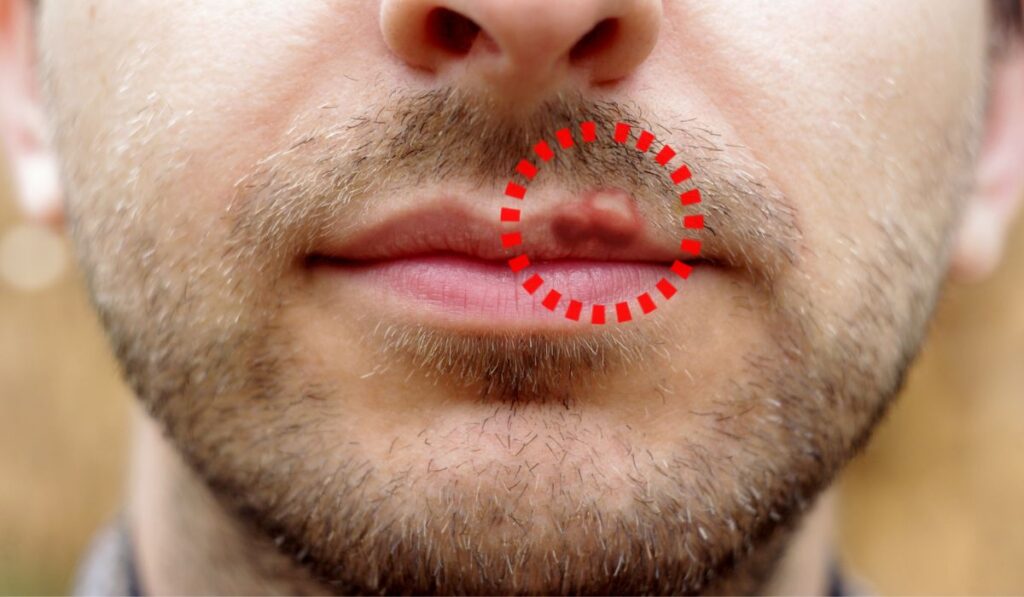Pain of any kind is awful to deal with, but a sore mouth is especially rough because it can make it difficult to talk, eat, and drink — things you can’t just stop doing until you feel better. Thankfully, there are a number of ways to deal with a sore mouth and certain foods that you can still eat while recovering.
The roof of your mouth may be sore due to an infection, oral herpes, or gingivitis, among other issues. Get plenty of rest, drink lots of fluids, and see a doctor or dentist if the symptoms don’t go away. While healing, eating can be difficult, but soups and popsicles can provide some relief.
Regardless of the cause, a sore mouth is never fun, and it can be concerning too. Let’s take a closer look at some possible causes, how to treat them, and what foods are safe to eat while you’re experiencing this issue.
Why Is the Roof of Your Mouth Sore?

There are many reasons why the roof of your mouth might hurt, including medical and environmental causes. The first thing to do when dealing with a new kind of pain is to try to understand the cause.
Sometimes, you can look at your lifestyle or environment and figure it out, but at other times, a trip to the doctor is required.
Viral Throat Infection
Sore throats are often caused by the same type of viruses you see in influenza and the common cold. Such a virus spreads when an infected person coughs or sneezes close to someone else who then inhales the contagions. It can even be contracted through touching a surface that the infection had been spread across.
The people most vulnerable to a viral throat infection are children, smokers, office workers, and anyone with a compromised immune system. Catching a viral throat infection is almost guaranteed at some point in your life and is incredibly common.
Generally speaking, symptom of a viral throat infection include pain when swallowing or talking, red and swollen tonsils, a fever, and body aches. You could also experience cold-like symptoms such as a cough, sneeze, and runny nose, so a viral throat infection is often mistaken for the common cold.
If symptoms don’t disappear, or at least begin to, within 24 hours, then it’s important to see a doctor. A persistently sore throat can be a sign of something more serious like mononucleosis, measles, chickenpox, or even croup.
Oral Herpes

Oral herpes, or HSV-1 is a condition that a lot of people suffer from. It’s easily transmitted when a person with active sores has intimate or sexual contact with another person via their mouth.
The first outbreak someone has tends to be the worst and most painful. It presents itself in a cluster of mouth sores with a fever, headache, sore throat, gum pain, and swollen lymph nodes.
Unfortunately, once you have the virus you can’t get rid of it. You can only practice safe distancing and refrain from intimate contact with another person while you have active sores.
Melanoma of the Mouth
MMHN is a rare form of cancer that occurs in about 10% of melanoma cases. It’s more common in the eldery population and has a very poor prognosis.
Symptoms generally include gum pain, gum swelling, brown colored skin changes, black colored skin changes, and a mouth rash. If you see these kinds of changes, it’s best to see your doctor as soon as possible and get the lesion biopsied right away.
Gingivitis
Gingivitis is an infection of the gums that surround the teeth. It’s caused by the buildup of a sticky layer of gunk from food particles, mucus, and bacteria called plaque or tartar. After a while, the plaque hardens and becomes tartar, a substance that needs to be removed by the dentist.
Plaque and tartar settle at the bottom of the teeth and make the gums irritated, and sometimes they become infected.
Gingivitis is especially dangerous and common during pregnancy, so it’s important to visit a dentist frequently or as soon as you notice symptoms. These generally include swollen or puffy gums, dark red gums, bleeding gums, bad breath, and receding and tender gums.
A Common Cold
Pretty much everyone has had a cold at some point. A cold is a contagious viral infection that can cause a cough, congestion, runny nose, and a sore throat. Most people get a few of them a year, and children tend to catch upwards of eight a year, given their close proximity to one another in school or at daycare.
A cold typically lasts 7 to 10 days, and while you’re sick, it’s best to refrain from hugging, kissing, or shaking hands with other people. You want to keep your distance from others since a cold can spread through airborne contagions from a cough or sneeze, but also from touching surfaces if you happen to rub your eyes, nose, or mouth without washing your hands after.
Cold Sores
Cold sores are also known as fever blisters or herpes. They’re tiny, fluid-filled blisters that are highly contagious through direct contact, shared towels, and eating utensils, if you have a visible outbreak.
Young adults tend to contract them the most, but once you get the virus, you’re stuck with it for life. Much like oral herpes, people who have an active outbreak need to distance themselves from engaging with other people in any oral activity.
Cold sores can also be accompanied by a fever, sore throat, and other flu-like symptoms, so some people aren’t even sure they’re having an outbreak. Fortunately, the blisters are always present and are a dead give away that you’re having a cold sore outbreak, rather than just a bad flu.
The blisters tend to last about 2–4 weeks, but the virus remains dormant within the body for life and can reoccur at any time, without warning. So, always pay attention to any new blisters or bumps near or in your mouth.
How Do You Treat a Sore Roof of Your Mouth?
Treating your sore mouth depends on why it’s hurting. So, after you have figured out what caused the soreness to begin with, you can then start to look at how to fix it.
Dealing with a Viral Throat Infection or Cold
If you have a viral throat infection or cold, it’s usually just a matter of time until you recover. Managing the symptoms is another thing entirely.
Rest is the most important thing you can do as the body heals when you’re asleep. You also want to make sure you’re consuming plenty of fluids.
There are over the counter pain relievers and medications that can help symptoms as well. Unfortunately, antibiotics have no beneficial response to viral infections.
Visiting the Dentist
If there’s something wrong with your oral health and pain is occurring at the roof of your mouth or near your gums, then it’s important to visit the dentist. Sometimes, all you need is to clean up some tartar and stop gingivitis from getting worse, but at other times, it could be something more serious.
So, if you notice something different about your mouth or are feeling pain, then visit a dentist as soon as possible to help diagnose and fix the issue.
Visiting the Doctor

It’s always important to make an appointment with your physician if you’re experiencing new pain that won’t go away on its own. Sometimes, what may seem harmless could turn into something aggressive and dangerous if left untreated, like cancer or other serious illnesses.
If you notice any new lumps, blisters or bumps, with or without accompanying pain, it’s a good idea to check in with your doctor to make sure you’re healthy.
What Can You Eat When the Roof of Your Mouth Hurts?
Having a lack of appetite while you aren’t feeling well is common, but you still need to eat and get those nutrients. Avoiding certain foods and sticking to soft, easily chewed items is the best way to go. Here are some tips for eating well while you’ve got mouth pain:
- Eat soft, bland and creamy foods with high calories and protein. Things like cream-based soups, cheeses, yogurts, and ice cream are great options that can help with a sore throat but still make you feel full.
- Soaking your food to make it soggy and softer is also an option. Things like cereal get soft when left in milk, but there are also options such as rice or pasta in a sauce that get more tender when left to soak.
- Chop your food into small bites or even put it through a pulse blender to quickly chop it up for easier eating. You can also mix it with sauce or gravy to take away some of the rough edges or harder pieces.
- Cooked vegetables and canned fruit are soft foods that can easily be eaten without putting too much pressure on the tender roof of your mouth. Alternatively, you can put these vegetables and fruits in a blender to make a smoothie.
- Chilled foods like popsicles, apple sauce, ice cream, and sherbet are not only easy to eat, but the cold temperature also soothes the mouth and makes it feel better, even if only for a short time.
- Avoid sour, acidic or salty foods since they can aggravate an already sore mouth and make it worse.
- Don’t try to eat rough foods because they can cut up a tender mouth or puncture internal mouth sores.
- Don’t over flavor your food with spices like chili powder, curry, or hot sauces since they can lead to extra irritation in your mouth.


